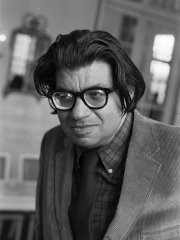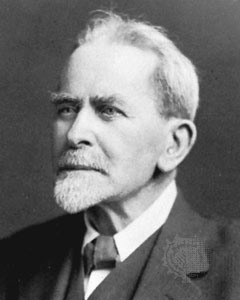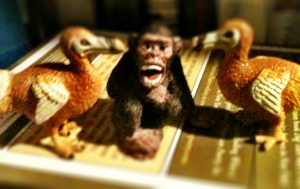Stephen McClurg's Blog, page 59
May 7, 2013
A Million Rowboats by Stephen McClurg
(found poem on pg. 2 of Eric Schlosser’s Fast Food Nation)
The twists and turns, like James Bond
driving little vans from cavern to satellites,
the tracks that orbit the heart,
power millions of rowboats, a barbershop, and a cafeteria.
The men get tired of the King.
Every night a man winds past
the checkpoint, chain link, and barbed wire.
April 4, 2013
Do I dare disturb the universe?
I started the year with the intention of writing in this space more. I even had outlined topics through February. Obviously that didn’t happen. But here’s some of what did:
Baby still can’t walk, but—like her dear old dad—has taken to climbing on couches, chairs, and tables. She likes to awkwardly bounce and shriek like a squirrel monkey once she’s achieved maximum height. Now, she’s doing some serious teething and is sometimes sick, grumpy, and is also leaking—from, like, everywhere. I did not know that making teeth was so hard.*
Afternoons are often taken up with baby-wrangling.
Much of the day is taken up with teaching, working on next year’s curriculum ideas, summer reading, grading, etc.
In the interims:
Way back in October or November, I was asked by the yearbook staff if I wanted to write a poem for the yearbook using its theme “The Inside Story.” I was given a list of quotes that were the original seeds of the theme and that were rejected. Evidently folks like Dostoevsky and Vonnegut just couldn’t hack the assignment.
No pressure there.
With the idea of “The Inside Story and the Story Inside,” I started writing a sestina because of the circularity I was imagining. Six or seven months later, this week, I finally had to step away and turn it in. The sestina has been the most difficult form that I’ve attempted. I may publish it here after the yearbook is available to students.
Podcasts and Journals and Panels:
A few friends and I are developing a blog and a journal. The early rumblings are here. We will update on Mondays and are currently gathering work….
I’m a semi-regular contributor in words or sounds to The Drunken Odyssey. I have some drafts of some music for the show and a short essay on The Shining that I need to finish. This show is a weekly ritual in my writing life and I love that host John King talks to a wide range of writers at various points in their careers.
A calculus teacher and friend has asked me to contribute to his new math podcast called For Each Epsilon. If one of my students is reading this then they will be wondering what I could possibly say about math since I can’t even correctly count anything that I hand out. They would be right and wouldn’t be questioning anything I didn’t myself. However, Mr. James (who’s absolutely and genuinely excited about math and interested in the world around him) is also interested in discussions of math as it applies to logic and music (and maybe even sci-fi), so this will be a nice opportunity to review some ideas and essays that I haven’t thought about in a long time. We’re developing topics….
And there are some other projects that are coming together including collaborating on some academic papers and panels connected to the worlds of education and writing and some sort of e-book collaboration, etc….
And, if you missed it, I wrote about 30 Things I Love Right Now. Or 30 things I loved right then.
Happy National Poetry Month!
*Besides the difficulty of teeth-making, I’ve just been informed that everyone in the house but me has walking pneumonia.


January 24, 2013
Noisy People
http://vimeo.com/channels/noisypeople
An interesting documentary about the Bay Area free improv scene. I’ve been listening to recordings by the composers and improvisors of the Bay Area since the mid-90s. Every now and then I’ve been lucky enough to hear a few of these folks in person.


January 10, 2013
Haunting the Chapel
 I’m just beginning to get into the music of Morton Feldman. His Rothko Chapel occupies a different space then I’m used to hearing in much 20th Century music. “Difficult” and “abrasive” are terms that more readily come to mind, but Rothko Chapel seems spare and, dare I say, beautiful—a word not traditionally used when describing the highbrow music of the era.
I’m just beginning to get into the music of Morton Feldman. His Rothko Chapel occupies a different space then I’m used to hearing in much 20th Century music. “Difficult” and “abrasive” are terms that more readily come to mind, but Rothko Chapel seems spare and, dare I say, beautiful—a word not traditionally used when describing the highbrow music of the era.
In researching Feldman, I came across this piece by The New Yorker’s Alex Ross: http://www.therestisnoise.com/2006/06/morton_feldman_.html which led me to this appreciation and slight exegesis: http://johnsonsrambler.wordpress.com/2005/01/17/music-since-1960-feldman-rothko-chapel
Feldman eventually became the go-to composer for one of my favorite authors, Samuel Beckett. Having read his complete works, I want to dive into Feldman’s compositions the same way and see if I have anything to add to the arguments about whether or not Feldman and Beckett were attempting to achieve something similar in their chosen mediums of expression.
I started listening to Rothko Chapel here:
https://www.youtube.com/watch?v=qxSt_w2ODaQ
and recently bought the SWR Vokalensemble Stuttgart recording conducted by Robert Huber.
An archive of material on Feldman: http://www.cnvill.net/mftexts.htm
And you can find out how to visit the Rothko Chapel (http://www.rothkochapel.org/).
(For some reason, html code for links wasn’t working!)


January 3, 2013
The Sound of Joy Is Enlightenment
“Saturn,” one of my favorite Sun Ra tunes, is also part of the amazing class of 1959 (on Jazz In Silhouette) which included recordings such as Kind of Blue by Miles Davis, Mingus Ah Um by Charles Mingus, The Shape of Jazz to Come by Ornette Coleman, Dave Brubeck’s Time Out, and Giant Steps recorded in 1959 by John Coltrane and released in January 1960.
I once had an idea to write an essay about these recordings when I thought I had discovered something based on my own personal listening. Recently I’ve found out that there a few essays and even a BBC documentary about jazz in 1959. Of course, I don’t think Sun Ra gets many mentions in any press about jazz in 1959, but he should.


December 31, 2012
Allow the soul time to return
Since 2012 began with the world’s end in mind, I thought I’d start 2013 with something else in mind. From Sir James George Frazer’s The Golden Bough:
“In some parts of Breadalbane it was formerly the custom on New Year’s Day to take a dog to the door, give him a bit of bread, and drive him out saying, ‘Get away, you dog! Whatever death of men or loss of cattle would happen in this house to the end of the present year, may it all light on your head!’ On the Day of Atonement, which was the tenth day of the seventh month, the Jewish high-priest laid both his hands on the head of a live goat, confessed over it all the iniquities of the Children of Israel, and, having thereby transferred the sins of the people to the beast, sent it away into the wilderness.”
So, on this first day, we should send our own “dogs,”–our worries, sins, fears–into the wild and attempt to look on the new year with new eyes and, maybe, new hearts.
An Irish toast puts it another way: May you never forget what’s worth remembering, and never remember what’s best forgotten.
Frazer’s work in comparative mythology and religion influenced Freud, Joseph Campbell, Eliot, Pound, and many, many others. I have never attempted to read the work as a whole, but The Golden Bough is a great reference work. Often, I find myself skimming the index and reading passages on subjects like “throwing death into the water” and “seven-headed, external soul of a witch in a snake.” Until recently, I didn’t know that the version I had was an abridgement that Frazer edited in 1922. I may actually read more of it if I find the individual volumes. I guess they’ve made it to my infinite reading list.
Along with mentions of Eliot, Apocalypse Now features at least one overt reference to Frazer. Among Kurtz’s books in the film lay The Golden Bough.
And even though I don’t believe this song was used in the film, Jim Morrison used some of Frazer’s words from The Golden Bough as inspiration for “Not to Touch the Earth.” Once you’ve seen the film, it’s difficult not to tie “The End” to the iconic images of that film.
And as usual, I can’t even follow my own rules. By attempting to not write about the end of the world I’ve now referenced Apocalypse Now and “The End.”
As Eliot wrote: “And the end and the beginning were always there/Before the beginning and after the end. / And all is always now.”
As one of the great 20th Century fools, in the sense of the great Shakespearean fools, put it: So it goes.
Happy 159th Birthday Sir James George Frazer!
May the road rise with you! Happy New Year!


November 27, 2012
Fowl Play: For the Birds: Pt. 2
4. The bird with the coolest name for the “Metallica” font: Archaeopteryx
“Without its feathers, Archaeopteryx looks much like a small coelurosaur such as a dromaeosaurid or troodontid.” Yup. More of that here and interesting info on bird/dinosaur history here.
5. The bird with the coolest name for any font: The Blue-footed Booby
Everything you wanted to know about boobies but were afraid to ask.
6. The coolest bird in Wonderland: The Dodo
“This question the Dodo could not answer without a great deal of thought, and it sat for a long time with one finger pressed upon its forehead (the position in which you usually see Shakespeare, in the pictures of him), while the rest waited in silence. At last the Dodo said, `EVERYBODY has won, and all must have prizes.’”

My monkey mind prodded by psychic emissions in the form of the Dodo.


November 25, 2012
Fowl Play: For the Birds: Pt. 1
Even though I should have started these entries earlier, I guess it’s never too late to give thanks. Since I have gnawed their bones on occasion, I decided I should give thanks to some of my favorite feathery friends.
1. Sam the Eagle
The Muppets gloriously warped me from the beginning and I’ve always loved Sam’s caustic, dry humor. The Muppet who hates being a Muppet. Here’s Rowlf the Dog and Sam the Eagle singing about birds.
2. Koko B. Ware and Frankie
There just aren’t enough birds in wrestling.
3. “Jealous Husband Returns In Form of Parrot”
And now some culture, Sam would want it that way. Well, not too much culture. It’s still the weekend and all. You can get Robert Olen Butler’s story here.


November 18, 2012
I like big books and I cannot lie…
If there’s ever been a constant in my life, it’s been books. My grandparents had a massive library and my mother and grandmother regularly took me to the library. I remember the day I was finally old enough to get my own library card. It was exciting, particularly for such a shy and nerdy kid.
Right now I’m participating in the most effective book group I have ever been a part of. Usually these things disintegrate. Most of us who like books also like particular genres and deciding on what to read next is always a problem. This book group managed all of Vonnegut’s novels and is currently moving through Hemingway’s. This group has two members and that may be a part of our success. We are up to The Green Hills of Africa and To Have and Have Not.
Because our reading has gone well, it’s been as enjoyable to plan the upcoming reads. So far, this is what we have:
After Hemingway, we will read notable 21st Century novels that we have missed:
American Gods: Neil Gaiman (2001)
Oryx and Crake: Margaret Atwood (2003)
The Curious Incident of the Dog in the Nighttime: Mark Haddon (2003)
No Country For Old Men: Cormac McCarthy (2005)
Kafka on the Shore: Haruki Murakami (2005)
Jonathan Strange and Mr. Norrell: Suzannah Clarke (2005)
The Brief Wondrous Life of Oscar Wao: Junot Diaz (2007)
The Book Thief: Markus Zusak (2007)
Asterios Polyp: David Mazzuchelli (2009)
Telegraph Avenue: Michael Chabon (2012)
Following this we are going to read five short story/essay collections of the 21st Century, as well. We know that one of the books will be Consider the Lobster by David Foster Wallace, but we are currently in negotiations on the other titles.
After that the five novels of Fitzgerald, maybe some of his short fiction, and then Faulkner.
I just read a friend’s book that I was reluctant to read because I didn’t want to not like it. My fears were silly. It’s an excellent book. I highly recommend The Evolution of Shadows by Jason Quinn Malott.
I recently wrote an essay on Where the Sidewalk Ends for John King’s podcast The Drunken Odyssey. I was very happy to be a part of Mr. King’s show since I listen to it every week. It will give those interested an inside view to what “the writing life” means for most folks out there practicing the wordly craft.
Oh, and this fond memory:


November 5, 2012
Fresh Out of the Oven and Back Into the Classroom
It’s been busy around here. I haven’t been in my classroom for a week because of flooding from a sprinkler. My daughter’s first Halloween and Day of the Dead, a debate tournament, a wedding reception, along with the normal but neverending stack of essays to grade have made for a week busier than usual. My students have been great. I hope they’re looking forward to getting back to a regular schedule and classroom (did I mention that our schedule has been different every day as well?).
Also, I’ve been polishing up and recording some essays and poems that have been picked up. More details as I have them, but you can read the first of three poems today that The Bakery will be publishing. I’m really happy to get some work highlighted over there. They are doing daily, weekly, and monthly specials and even Sunday horoscope poems. I love the format of this online magazine. Check it out: http://www.thebakerypoetry.com/this-i...






